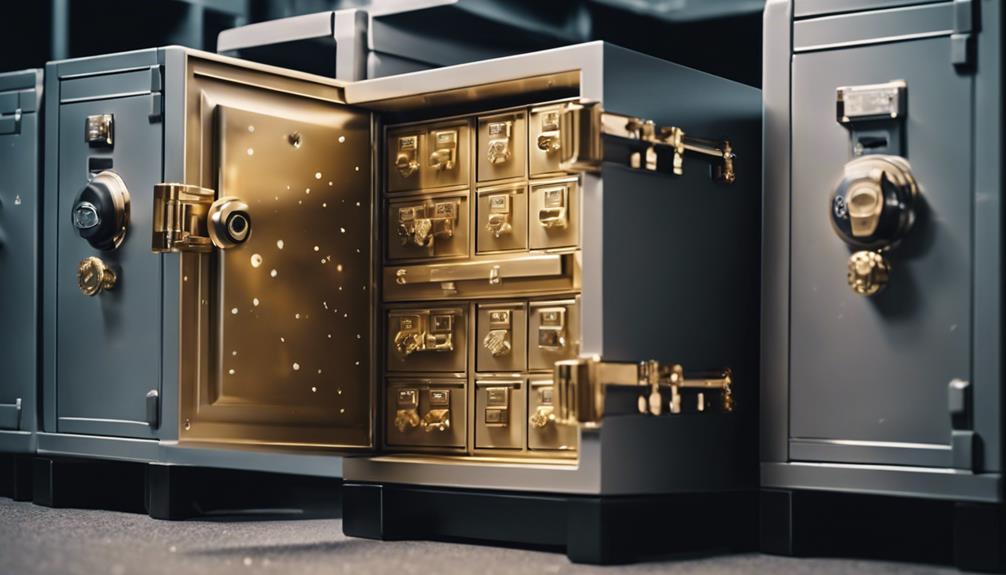In order to comply with IRS regulations and maximize benefits, it is essential for Gold IRA storage options to be in line with approved depositories. Storing gold at home is not allowed due to potential tax repercussions, whereas approved facilities maintain tax-advantaged status. Failure to comply can lead to penalties and taxable distributions. It is crucial to adhere to strict security measures to protect investments. Custodians play a crucial role in ensuring compliance by overseeing transactions and keeping detailed records. Understanding the tax implications, such as deductibility and capital gains taxes, is crucial for maximizing financial gains. Exploring these legal aspects can help optimize your Gold IRA storage choices.
Key Takeaways
- Home storage of Gold IRAs is prohibited by the IRS to maintain tax advantages.
- Approved depositories must be used to comply with IRS regulations for Gold IRA storage.
- Non-compliance with storage rules can result in penalties and taxable distributions.
- Custodians play a crucial role in ensuring compliance and security of Gold IRA assets.
- IRS-approved depositories offer secure storage options with stringent security measures.
Gold IRA Legal Framework

Within the regulatory landscape governing Gold IRAs, compliance with approved storage options is essential to guarantee adherence to IRS regulations. The legal framework surrounding Gold IRAs mandates that investors utilize approved depositories for storing their precious metals, prohibiting home storage to prevent potential tax implications and ensure compliance.
Failure to abide by IRS guidelines regarding Gold IRA storage can result in severe consequences such as taxable distributions and penalties. Approved depositories play a pivotal role in maintaining the tax-advantaged status of Gold IRAs, shielding investors from legal risks and ensuring the security of their retirement savings.
Understanding the implications of different storage choices is imperative for investors to safeguard their assets effectively and steer clear of regulatory pitfalls. By adhering to approved storage options and the legal framework set forth by the IRS, individuals can uphold the integrity of their Gold IRAs and navigate the complexities of compliance with confidence.
IRS Compliance for Gold IRA

To guarantee IRS compliance for a Gold IRA, it is essential to adhere to the rules and regulations set forth by the IRS. Failure to follow these guidelines can result in penalties and taxable distributions. Hence, it is imperative to store precious metals in an approved custodian or IRS-approved depository.
IRS Gold IRA Rules
Compliance with IRS regulations governing Gold IRA storage is essential for maintaining the tax-advantaged status of precious metals held within the account. When it comes to IRS Gold IRA rules, several key points must be considered:
- Precious metals in a Gold IRA must be held by an approved custodian to comply with IRS regulations.
- Self-storage of precious metals in a Gold IRA at home is strictly prohibited by the IRS.
- Storing Gold IRA assets at home can lead to tax penalties and may be viewed as self-dealing.
- Violating IRS guidelines on self-storage of Gold IRA assets could result in taxable IRA distributions.
Compliance Requirements for Gold
Ensuring adherence to IRS regulations is crucial when it comes to storing gold in a Gold IRA to maintain its tax-advantaged status. IRS-approved depositories are a requirement for safeguarding precious metals within a Gold IRA.
Custodians play an essential role in ensuring compliance with IRS rules for Gold IRA storage, as non-compliance can lead to penalties. Understanding and following IRS regulations is essential to avoid legal issues associated with Gold IRA storage.
Failure to meet compliance requirements set forth by the IRS can jeopardize the tax benefits associated with Gold IRAs. As a result, investors must carefully select custodians and depositories that adhere to the IRS guidelines to safeguard their investments and maintain the favorable tax status of their Gold IRAs.
Home Storage Regulations

When considering the regulations surrounding home storage of gold IRA assets, it is essential to understand the laws governing this practice. Home storage laws dictate that storing precious metals in a self-directed IRA at home is prohibited, as it is deemed self-dealing by the IRS. The security requirements that must be met are stringent to ensure the safety and protection of the assets. To avoid severe tax penalties and guarantee compliance, utilizing IRS-approved depositories for storing precious metals in a self-directed IRA is imperative. Complying with IRS regulations is crucial to maintain the tax-advantaged status of the account and ensure that the assets are safeguarded properly.
Home Storage Laws
To safeguard the tax-deferred status of gold IRA assets, adherence to IRS regulations regarding storage locations is essential, with home storage being strictly prohibited. Home storage laws for gold IRAs carry significant implications and risks that investors must consider:
- IRS Regulations: The IRS prohibits storing gold IRA assets at home to maintain compliance.
- Tax Penalties: Violating IRS rules on storage may result in severe tax penalties.
- Risk Factors: Storing precious metals from a self-directed IRA at home is considered non-compliant and risky.
- Impact on Retirement Savings: Failure to comply with storage regulations can lead to the loss of retirement savings benefits.
Understanding the legal implications of home storage for gold IRAs is vital to avoid potential financial repercussions and penalties.
Security Requirements Overview
Adherence to approved depositories for storing precious metals in a self-directed IRA is vital to comply with IRS regulations and avoid potential legal risks associated with home storage. IRS rules prohibit home storage of gold in a Gold IRA, emphasizing the use of approved depositories. Non-compliance with these guidelines can lead to severe penalties, including taxable distributions from the IRA.
Storing IRA gold at home may be viewed as self-dealing, resulting in further legal consequences. To safeguard against such risks, it is essential for individuals to follow IRS regulations by utilizing approved depositories for storing precious metals in their self-directed IRAs. By doing so, investors can guarantee compliance and mitigate potential penalties associated with improper storage of IRA assets.
Compliance With Regulations
Complying with IRS regulations regarding the storage of gold in IRAs is essential to avoid severe penalties and legal risks associated with home storage. When considering home storage for traditional Gold IRAs, adherence to IRS regulations is vital due to the risks and potential consequences involved. To guarantee compliance with IRS regulations and maximize tax advantages, individuals opting for home storage gold IRAs should consider the following:
- Understand the specific legal requirements for home storage gold IRAs.
- Be aware of the penalties associated with non-compliance with IRS regulations.
- Consider the risks of potential loss of tax-deferred status and increased fees.
- Evaluate the option of utilizing secure storage facilities to meet IRS regulations effectively.
Professional Depository Requirements

Meeting stringent IRS criteria, professional depositories for Gold IRAs are mandated to uphold impeccable standards in secure precious metal storage. These depositories offer high-level security measures such as surveillance, insurance, and physical safeguards to guarantee the protection of investors' assets. Segregated storage options are provided to ensure that individual holdings remain separate and identifiable. Compliance with IRS regulations is essential for professional depositories to maintain their status and instill trust in investors.
Reputable depositories like Delaware Depository and International Depository Services are popular choices known for their adherence to industry standards and commitment to secure storage practices. By choosing these trustworthy entities, investors can have peace of mind knowing that their precious metals are held in facilities that prioritize safety and compliance with regulatory requirements, minimizing the risk of loss or theft.
Selecting a professional depository with a solid reputation is vital when safeguarding one's Gold IRA investments.
Legal Risks of Home Storage

Choosing to store gold IRA assets at home poses significant legal risks and potential consequences that investors need to carefully consider. When it comes to home storage of gold IRAs, several key points should be noted:
- IRS Rules: Storing gold IRA assets at home violates IRS rules, which can lead to severe tax penalties.
- Legal Consequences: Non-compliance with IRS regulations on home storage of gold IRAs may result in facing legal consequences.
- Court Cases: Recent court cases have highlighted the risks and potential penalties associated with choosing home storage for gold IRAs.
- Administrative Duties: Managing complex administrative duties and ensuring compliance with regulations can be challenging for individuals opting for home storage, compared to the streamlined processes offered by professional depositories.
Considering the risks of losing tax-deferred status and facing increased fees, investors must weigh the convenience of home storage against the legal implications and administrative burdens it entails.
Professional depositories often provide a more secure and compliant alternative for safeguarding gold IRA assets.
Security Measures for Gold IRA

In order to guarantee the safeguarding of Gold IRA assets, investors should prioritize reputable depositories that offer high-level security measures and customized storage solutions. Reputable depositories like Delaware Depository and International Depository Services are known for providing excellent security measures for Gold IRAs. Facilities such as Brinks offer customizable security features and worldwide locations, ensuring the safekeeping of precious metals.
When considering security measures for Gold IRA storage, factors like accessibility, liquidity, custodian trustworthiness, and facility integrity should be taken into account. Accessibility is important for easy monitoring and potential liquidation of assets, while the trustworthiness of the custodian and the integrity of the storage facility play significant roles in ensuring the safety of the investments.
Customizable security features provided by reputable depositories enhance the protection of Gold IRA assets, making them a preferred choice for investors looking to secure their wealth effectively.
Custodial Responsibilities

Given the intricate nature of safeguarding Gold IRA assets, a pivotal aspect that demands careful consideration is the custodial responsibilities associated with overseeing these physical precious metals holdings. Custodians of Gold IRAs play an essential role in ensuring the security and compliance of these assets with IRS regulations.
Here are four key points highlighting their responsibilities:
- Safeguarding Assets: Custodians are entrusted with the task of holding and safeguarding the physical precious metals that constitute the Gold IRA, protecting them from theft or damage.
- Compliance with IRS Regulations: It is imperative for custodians to adhere to IRS regulations governing the storage and handling of Gold IRA assets to maintain the account's tax-advantaged status.
- Facilitating Transactions: Custodians facilitate various transactions within the Gold IRA, including purchases, sales, and transfers of physical precious metals, ensuring proper documentation and compliance.
- Maintaining Records: Detailed record-keeping of the precious metals held in the account is a critical responsibility of custodians, aiding in transparency and audit trails for regulatory compliance and client oversight.
Tax Implications for Gold IRA

Delving into the tax implications of Gold IRA investments reveals the essential financial considerations that accompany these unique retirement accounts. Contributions made to a Gold IRA are tax-deductible, mirroring the treatment of Traditional IRAs, providing investors with potential tax benefits during their contribution years.
Conversely, Roth Gold IRAs offer the advantage of tax-free withdrawals upon retirement, presenting a tax-efficient option for those looking to manage their tax liabilities in the future. However, it is important to note that capital gains tax is applicable to the sale of precious metals from a Gold IRA, impacting the overall tax consequences of such transactions.
Proper reporting of Gold IRA transactions on tax returns is essential for compliance with IRS regulations, emphasizing the need for accurate record-keeping and adherence to tax laws. Seeking guidance from tax professionals can offer valuable insights into the tax implications of Gold IRA investments, ensuring that investors navigate this complex tax landscape effectively.
Frequently Asked Questions
Where Can I Store My Gold Ira?
To safeguard your gold IRA, you must use IRS-approved depositories due to regulations. Storing these assets at home is against IRS guidelines and can lead to penalties. The IRS prohibits self-storage of precious metals in an IRA to prevent tax penalties. Non-compliance with storage rules can result in taxable distributions.
Utilizing an approved custodian for storage guarantees compliance and safeguards IRA assets.
Is a Home Storage Gold IRA Legal?
Storing gold acquired for an IRA at home is not considered essential under IRS rules. Home storage of IRA gold can result in tax penalties and non-compliance issues. Recent court cases have highlighted the risks associated with this practice.
Establishing an LLC and using professional depositories are recommended for compliant storage options. It's vital to adhere to legal requirements to avoid potential penalties and guarantee the security of your IRA assets.
Can You Personally Hold Gold in an Ira?
While individuals cannot personally hold gold in an IRA according to IRS regulations, they can invest in gold through approved custodians who handle storage. Personal possession of gold from an IRA can lead to tax penalties, as IRS-approved depositories are required for compliance.
Non-compliance with these rules can result in penalties and taxable distributions. Hence, it is essential to follow IRS guidelines to avoid legal implications and financial consequences related to gold IRA storage choices.
What Are the Cons of a Gold Backed Ira?
Investing in a Gold IRA can come with drawbacks. The value of gold can be volatile, leading to potential losses in a Gold IRA. Additionally, physical gold storage and insurance costs can eat into overall returns.
Compared to other investments, Gold IRAs may have limited growth potential, affecting long-term wealth accumulation. Understanding these cons is vital for investors to make informed decisions about including gold in their retirement portfolios.
Conclusion
Ultimately, the legal implications of gold IRA storage choices are intricate and necessitate careful consideration. While home storage may seem convenient, it comes with significant risks and regulatory requirements.
Professional depositories offer a more secure option but also involve custodial responsibilities. Understanding IRS compliance, security measures, and tax implications is vital for maintaining a compliant and profitable gold IRA investment.
It is essential to weigh the benefits and risks of each storage option before making a decision.









